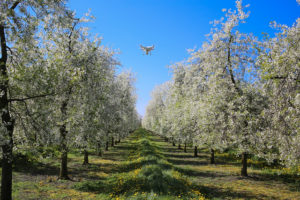
Food security is a global problem that requires a global solution. An international group of researchers led by Dr. Stanley Best, Director Nacional Programa Agricultura de Precisión of INIA Quilamap in Chile, is tackling one aspect using a system of autonomous drones: specifically, a DJI prosumer drone with a Heisha autonomous drone charging system.
The “SmartFruit” project is a large undertaking: one that will examine areas of precision agriculture including remote sensing, phenotyping, proximal sensing development, and robotics. INIA de Chile, Chile’s Agricultural Research Insitution, has partnered with the University of Talca and the University of Maule to create a special research center.
It’s a project with far-reaching potential impact for large growers around the globe, and will allow researchers to gather much more data to make strategic growing decisions. The project is also supported by APEC (Asia Pacific Economic Cooperation) because of it’s potential benefits.
“As I can see that the successful fruition of this project (a collaboration between Chile and China) will have a positive impact on the agriculture productivity…we will list this project as part of our workplan activities for 2019 and 2020,” announced Mathew Tan, Co- Chair for Sustainable Development in Agriculture and Fishery sectors, APEC Policy Partnership on Food Security.
Miriam McNabb is the Editor-in-Chief of DRONELIFE and CEO of JobForDrones, a professional drone services marketplace, and a fascinated observer of the emerging drone industry and the regulatory environment for drones. Miriam has penned over 3,000 articles focused on the commercial drone space and is an international speaker and recognized figure in the industry. Miriam has a degree from the University of Chicago and over 20 years of experience in high tech sales and marketing for new technologies.
For drone industry consulting or writing, Email Miriam.
TWITTER:@spaldingbarker
Subscribe to DroneLife here.